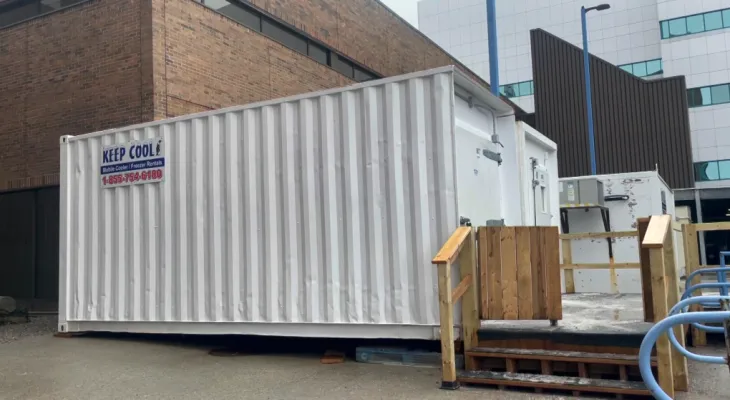Search here
Newspaper
Search here

Arab Canada News
News

Published: March 8, 2024
A group of industrial refrigerators is located far away near Reception Bay and just feet from a green garbage container, holding an increasing number of human remains outside the largest hospital in Newfoundland and Labrador.
These refrigerators are surplus units for the hospital morgue, which is becoming fuller with unclaimed human remains.
The problem has become so large that health officials in St. John’s are now planning to build a permanent storage unit to expand space in the hospital morgue.
Health Minister Tom Osborne told reporters on Wednesday: “I will admit it is concerning.” "When I heard about this, I looked at those units myself, and as you know, it definitely falls on one person. Anyone with any empathy will find it disturbing.”
Opposition leaders in Newfoundland and Labrador say more families simply can’t afford funeral bills to bury or cremate their loved ones. Instead, the bodies are left in the storage facility."
Jim Dinn, leader of the New Democratic Party in Newfoundland and Labrador, told the House of Assembly on Wednesday that “this government brought in freezer trucks because it was focusing on cost savings more than focusing on basic human dignity.”
He said, “This government has failed to ensure support programs are properly funded and linked to inflation.”
Regional government support pays up to $2,338 for some families to apply for financial help, but opposition leaders in the province say these rates have not been updated for years.
Osborne told reporters on Wednesday he is not “sure” why more and more bodies are being held in the hospital morgue.
There is a process through which the provincial government can appoint a public trustee to arrange funeral services if the closest relatives cannot, or do not want to, make the arrangements themselves. Osborne said this process is complicated and lengthy, contributing to the backlog.
Samantha Lahey said her grandfather, Jerry Rice, narrowly survived this fate.
Her family is one of many families struggling to pay the rising costs of funerals and end-of-life services.
When he died in February, her family faced an $8,000 funeral bill, a bill that had to be paid in full before the funeral home took Rice’s remains from the long-term care home where he died.
Lahey and her partner raised funds and worked tirelessly for a few days to gather this money – and when they did, it was too late.
A funeral home director told Lahey that her grandfather’s body had deteriorated so much it could not be buried. They proceeded to cremate the body instead.
She said, “My grandfather was in a refrigerated room in the basement.” “He was in a refrigerated room. To me, that’s just being in the basement without heating.”
Lahey says if it had not been for fundraising and charities from friends and family, her grandfather would have ended up in the surplus morgue in St. John’s.
“My grandfather would have definitely ended up 100 percent in that trailer.”
She described their experience after her grandfather’s death as heartbreaking—and doesn’t understand why the funeral home could not have helped them sooner.
Lahey said the immediate financial pressures her family faced after her grandfather’s death made the grieving process more difficult.
“He always cared for everyone, and knowing that we couldn’t care for him even though he cared for everyone, I think it’s hard to accept that.”
Comments